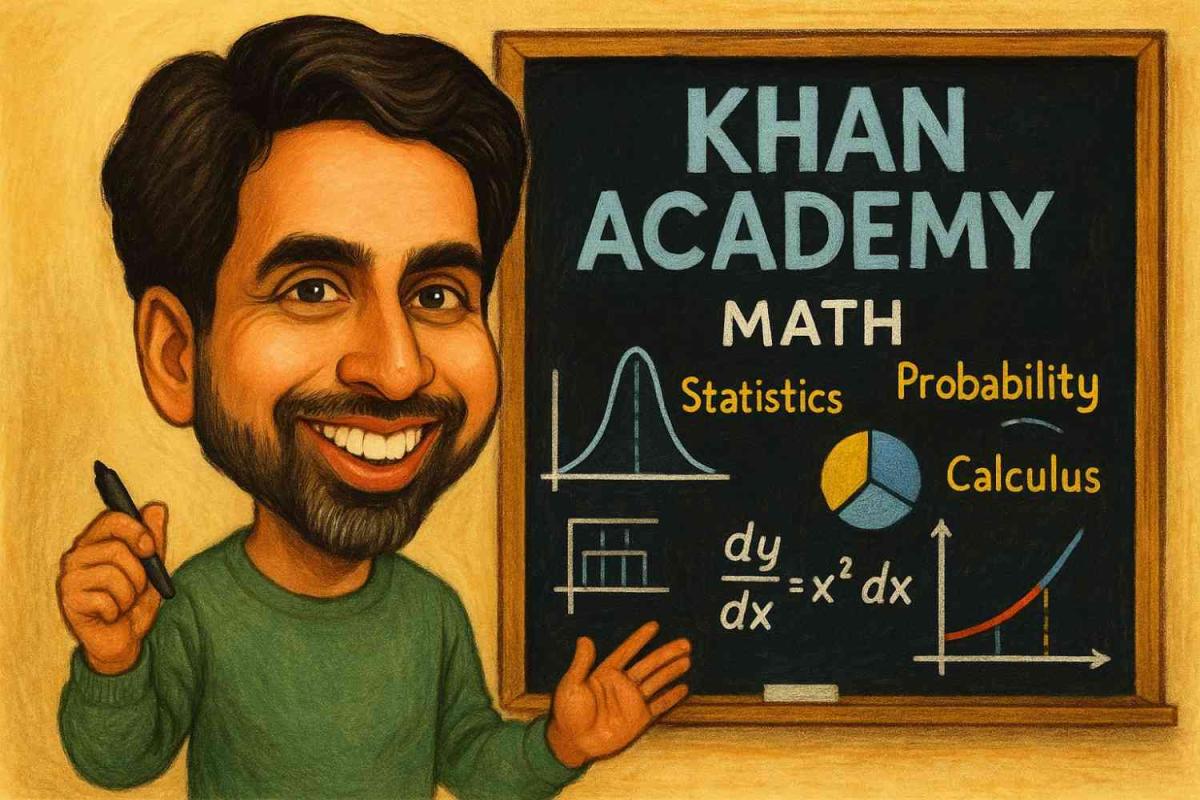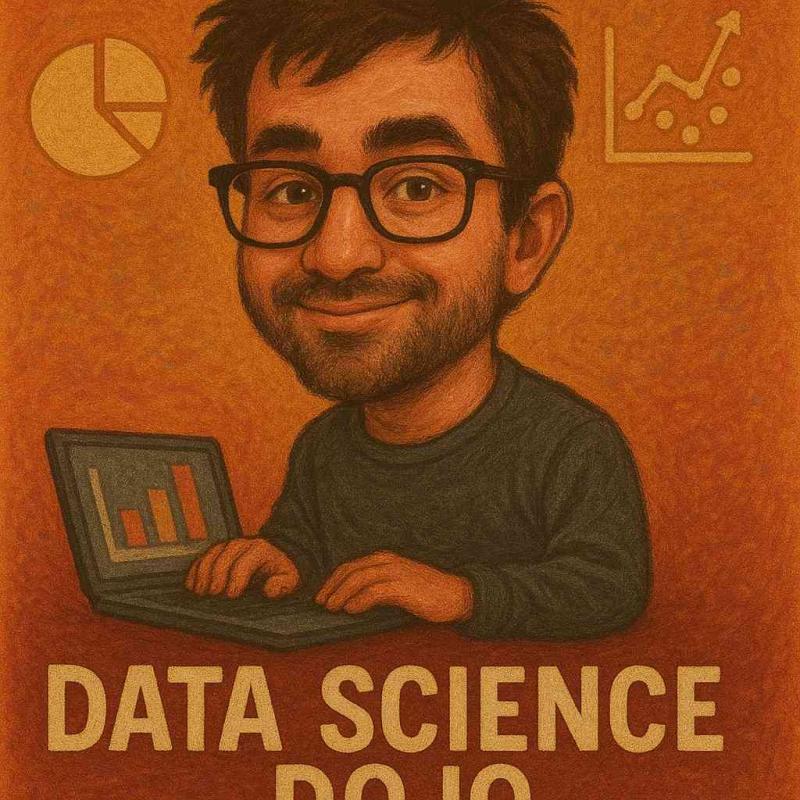Khan Academy: The Free Math Powerhouse That (Quietly) Built the Brains Behind AI
Let me just get this out of the way: if Khan Academy were a person, I’d owe them coffee. And probably a handwritten thank-you note. Because without their calm, friendly voice guiding me through just one more statistics lesson at 2 AM, I might’ve abandoned my data science dreams for something more forgiving. Like interpretive dance.
But hey, here we are. Still neck-deep in math, still grateful for a platform that makes it feel, well... possible.
Khan Academy isn’t flashy. It doesn’t have the swirling animations of 3Blue1Brown or the gamified frenzy of Duolingo. But when it comes to comprehensive math tutorials, especially the stuff that matters for AI and data science—statistics, probability, calculus—it’s the undisputed GOAT. And yes, I said that with my whole chest.
So, What Is Khan Academy Exactly?
Quick history lesson: Khan Academy started as a guy (Sal Khan) making math videos for his cousin. Which is adorable. Fast-forward a bit, and it's now a massive nonprofit offering free, high-quality education to literally anyone with internet.
The platform covers everything from elementary math to college-level calculus. And unlike most educational content, it doesn’t make you feel like you’re trying to decode the Voynich manuscript.
But here’s the kicker: for people looking to get into AI, machine learning, or data science, Khan Academy offers an absolute goldmine. No subscription. No credit card. No annoying paywalls halfway through a lesson. Just pure, unfiltered knowledge.
Why Khan Academy Is a Secret Weapon for Aspiring Data Nerds
Here’s the thing they don’t always tell you when you start learning AI or data science: math is non-negotiable. Python? Sure. Pandas? Nice. TensorFlow? Great.
But if you don’t understand how derivatives, probability distributions, or standard deviation actually work? You’re just throwing numbers into a blender and hoping for a smoothie.
Khan Academy swoops in like a helpful sidekick—no cape, just solid pedagogy—and says, “Hey, here’s how this stuff really works.”
Here's what makes it perfect for AI-related learning:
-
Complete, structured paths for core subjects:
-
Statistics & Probability: Covers mean, median, standard deviation, normal distribution, Bayes’ Theorem—aka your machine learning starter pack.
-
Calculus: Focuses on derivatives, integrals, limits, and multivariable calculus. Vital for training models and understanding optimization.
-
Linear Algebra: Not the flashiest series, but enough to grasp vector spaces and matrix transformations.
-
-
Incremental lessons: You never jump from 0 to eigenvectors. Each concept builds naturally on the last (which, IMO, is way more humane than most college syllabi).
-
Practice problems and mastery challenges: Not just video lectures. You get interactive questions that help you internalize what you just learned. Like mini math workouts.
-
Immediate feedback: Got it wrong? Try again, no judgment. Got it right? Yay, dopamine.
Stats & Probability: The Unsung Heroes of AI
Let’s talk about stats, shall we? Everyone loves to focus on deep learning and algorithms, but in the real world? It’s statistics doing the grunt work.
And Khan nails this section.
The way they explain variance, hypothesis testing, sampling, and confidence intervals—it’s clear, slow enough to follow, but never condescending. Sal doesn’t assume you’re dumb, but he also doesn’t assume you’re already a professor at MIT.
Some personal favorites:
-
"Intro to Probability": Understand how likelihoods actually work. No coin-flipping metaphors required (although they do show up occasionally—classic move).
-
"Bayes’ Theorem": If you're in AI or machine learning, knowing Bayes isn't optional. Trust me.
-
"Normal Distributions and Z-Scores": Super useful for any kind of predictive modeling.
Calculus: Still Scary, But Less So With Khan
Here’s the thing: I used to dread calculus. And not in the “haha quirky fear of numbers” way—genuine textbook-induced panic.
But then I started watching Khan’s calculus videos.
Instead of jumping into 15-step integrals, they start by literally just drawing a slope on a curve. And explaining it. And asking, “Hey, what happens if we make this line shorter?” Suddenly, the derivative becomes a concept, not just a formula.
Why it matters for AI:
-
Gradient descent, the thing that powers model optimization, is 100% calculus.
-
Understanding rates of change, area under curves, and local minima helps you write better models and interpret them accurately.
But Is It Fun?
Okay, fun might be a stretch. But surprisingly engaging? Yes.
There’s something soothing about Sal Khan’s voice. It’s like Bob Ross, but instead of trees, you’re painting distributions and logarithms. He doesn’t talk down to you. He’s not rushing. It’s like he’s on your side. And weirdly, that helps.
Plus, there’s gamification! You can earn points, badges, even “level up” in certain topics. (Yes, I’m 30. Yes, I still get a little hit of pride when I earn a new badge. Don’t judge.)
Limitations? Sure. But Nothing Fatal.
No tool is perfect. And Khan Academy isn’t trying to be everything for everyone. It’s not going to replace a full college-level machine learning course or go deep into neural networks.
Also:
-
Some videos feel a bit dated (chalkboard-style, low-res visuals).
-
It lacks real-world coding integration—you’re not going to build a scikit-learn model from their content.
-
No community discussion or peer interaction, which some folks love (I’m 50/50 on that, personally).
Still, none of those things stop it from being one of the best starting points for anyone trying to break into technical fields.
TL;DR: If You’re Learning AI, Start Here
You don’t need to enroll in a $5,000 bootcamp just to get the basics.
Khan Academy:
-
Covers every essential math concept for AI and data science
-
Explains things clearly, patiently, and without any academic ego
-
Gives you structured practice and feedback
-
Costs exactly $0.00
Not to be dramatic, but for a lot of people, Khan Academy literally changes lives. Especially for those of us who didn’t get a golden ticket to MIT or just need a second (or third) pass at math concepts we rushed through in school.
One Final Nudge (and Slightly Sappy Moment)
If you’re staring at a machine learning course and your eyes glaze over every time someone mentions “logarithmic loss” or “L2 regularization,” go back to the fundamentals. Don’t muscle through. Go learn what a logarithm is first. Or what a slope means.
Then come back swinging.
And if you’re anything like me? You’ll have Sal Khan’s voice echoing in your head while you train your first model. Not quite Morgan Freeman, but pretty close. 😉
Go give it a try. Your future AI-self will thank you.



